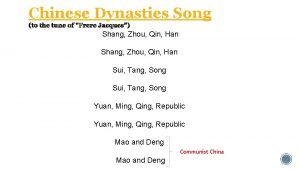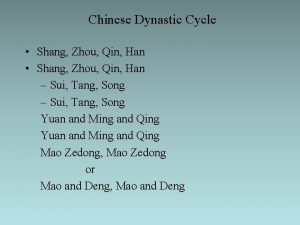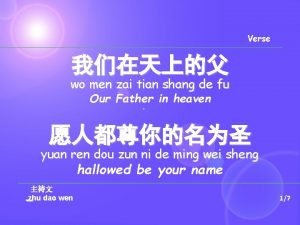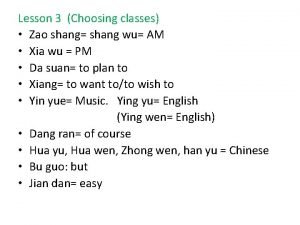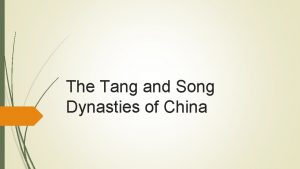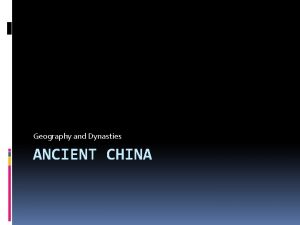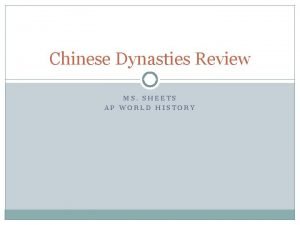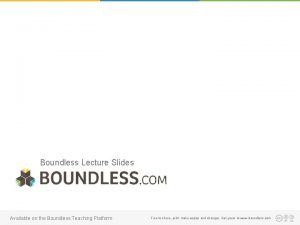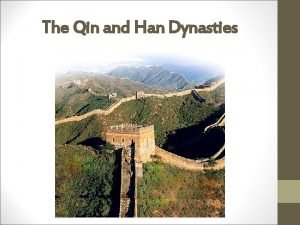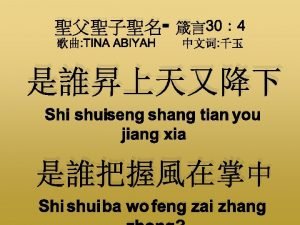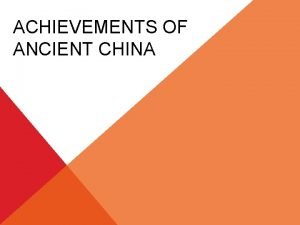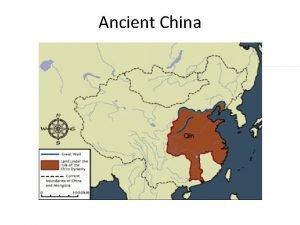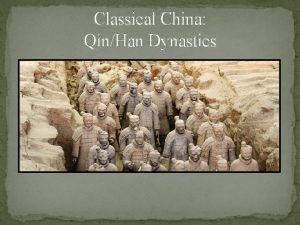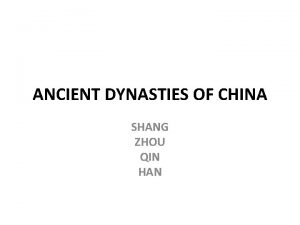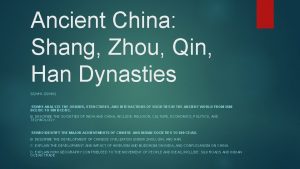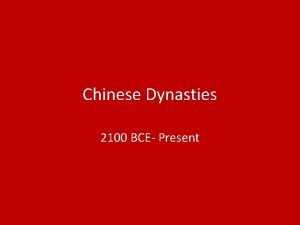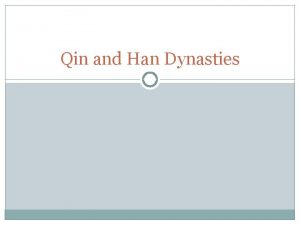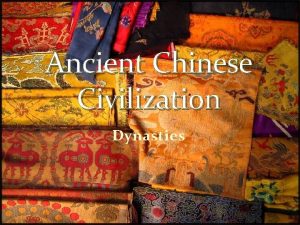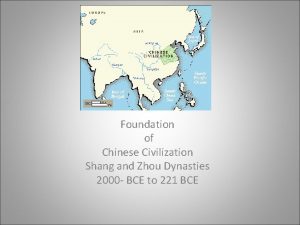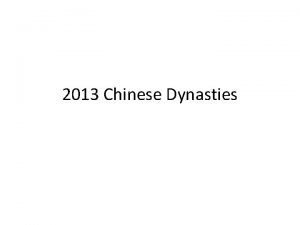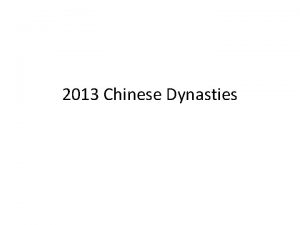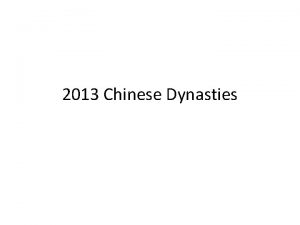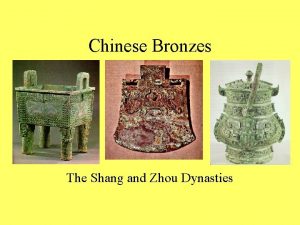Ancient Chinese Dynasties Xia Shang Zhou Qin The















- Slides: 15

Ancient Chinese Dynasties 中國歷朝歷代 Xia, Shang, Zhou, Qin

• The walls of China’s first cities were built 4, 000 years ago. – This was at least a thousand years after the walls of Ur, the great pyramids of Egypt, and the planned cities of the Indus Valley were built.

Government of China • China was controlled by what are referred to as dynasties- ancient families that ruled China for several hundred years at a time. – The first Chinese Dynasty was the Xia (shyah) that ruled China from the 21 st-17 th century B. C. E. • The Shang Dynasty followed and lasted from around 1700 B. C. E. to 1027 B. C. E – They were 1 st to leave written records. – The Shang kings built elaborate palaces and tombs

Chinese Values • In the Chinese view, people who lived outside of Chinese civilization were barbarians. • Because the Chinese saw their country as the center of the civilized world, their name for China was ‘the Middle Kingdom’. • Chinese culture taught that the group is more important than the individual. – Because of this they are very loyal and prideful to their families and to their governments.

Men and Women’s Roles • The elder men in the family controlled the family’s property and made important decisions. • Women, on the other hand, were treated as inferiors. – They were expected to obey their fathers, their husbands, and later, their own sons. – When a girl was between 13 and 16 years old, her marriage was arranged, and she moved into the house of her husband. Only by bearing sons for her husband’s family could she hope to improve her status.

Religion in Ancient China • The Chinese believed that the spirits of family ancestors had the power to bring good fortune or disaster to living members of the family. • Shang kings consulted the gods through the use of oracle bones, animal bones and tortoise shells that priests had scratched questions for the gods. • After inscribing a question on the bone, a priest applied a hot poker to it, which caused it to crack. The priests then interpreted the cracks to see how the gods had answered.

Zhou Dynasty • Around 1027 B. C. , the Zhou (joh) overthrew the Shang and established their own dynasty. – The Zhou had adopted much of the Shang culture so the change in dynasty did not bring sweeping cultural change. • To justify their conquest, the Zhou leaders declared that the final Shang king had been such a poor ruler that the gods had taken away the Shang’s rule and given it to the Zhou. • This justification developed over time into a broader view that royal authority came from heaven.

Mandate of Heaven -Heaven gave authority to rule to a worthy ruler. In order to remain worthy and keep the mandate, kings had to be virtuous and have concern for the welfare of the people. If the king was not, then he would loose the mandate and be overthrown by another, more worthy clan.

The Zhou Dynasty lasted for at least eight centuries, from approximately 1027 to 256 B. C

• Toward the end of the Zhou Dynasty, China moved away from its ancient values of social order, harmony, and respect for authority. Chinese scholars and philosophers developed different solutions to restore these values

Confucius • China’s most influential scholar – Lived in the time when the Zhou Dynasty was in decline • Wanted to restore the order and moral living of earlier times • He wanted to show rulers how to govern wisely • His ideas become the foundation for China’s government

• Believed in 5 basic relationships • These were the relationships between: 1) ruler and subject 2) father and son 3) husband wife 4) older brother and younger brother 5) friend and friend.

Qin Dynasty In the third century B. C. E. , the Qin (chin) 221 -206 BCE Dynasty replaced the Zhou Dynasty. In contrast to Confucianism, Their ruler, Shi Huangdi – “First Emperor”, practiced legalism. § Beliefs: § - do anything to maintain order - strict laws - harsh punishment - imposed high taxes - censorship of ideas ie. - killed Confucian scholars b/c criticized him § * First time China united as one empire

Under the Qin • During the Qin dynasty the Chinese language and writing were standardized making communication easier • They also standardized other including currency, measurements, and axle lengths. • Built the Great Wall of China in the northern part to block invaders (Mongols)

Art/Architecture – Burial Tomb / Terracotta Army Terra Cotta Army Video
 Shang zhou qin han song
Shang zhou qin han song What is the dynastic cycle in china
What is the dynastic cycle in china Xie gei tian shang de ni
Xie gei tian shang de ni Zao shang hao zhong guo
Zao shang hao zhong guo Empress wu accomplishments
Empress wu accomplishments Zhou dynasty geography
Zhou dynasty geography Ap world history chinese dynasties
Ap world history chinese dynasties Chinese dynasties
Chinese dynasties Shang dynasty
Shang dynasty Shang dynasty acrostic poem
Shang dynasty acrostic poem Four chinese dynasties
Four chinese dynasties Shang abi是誰
Shang abi是誰 Achievements of the shang dynasty
Achievements of the shang dynasty Ancient china roads
Ancient china roads Zhou dynasty wars
Zhou dynasty wars Anglo chinese primary
Anglo chinese primary
